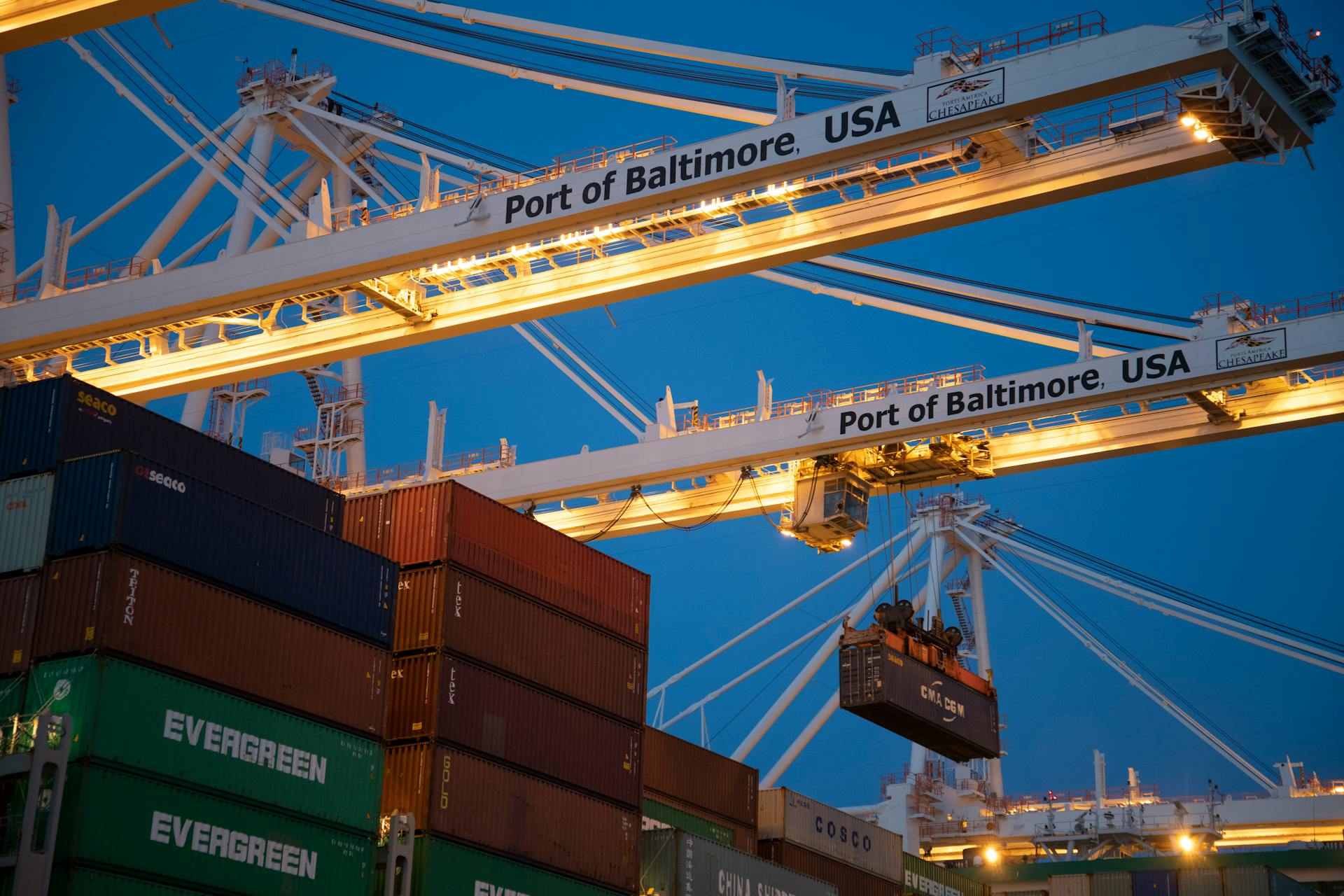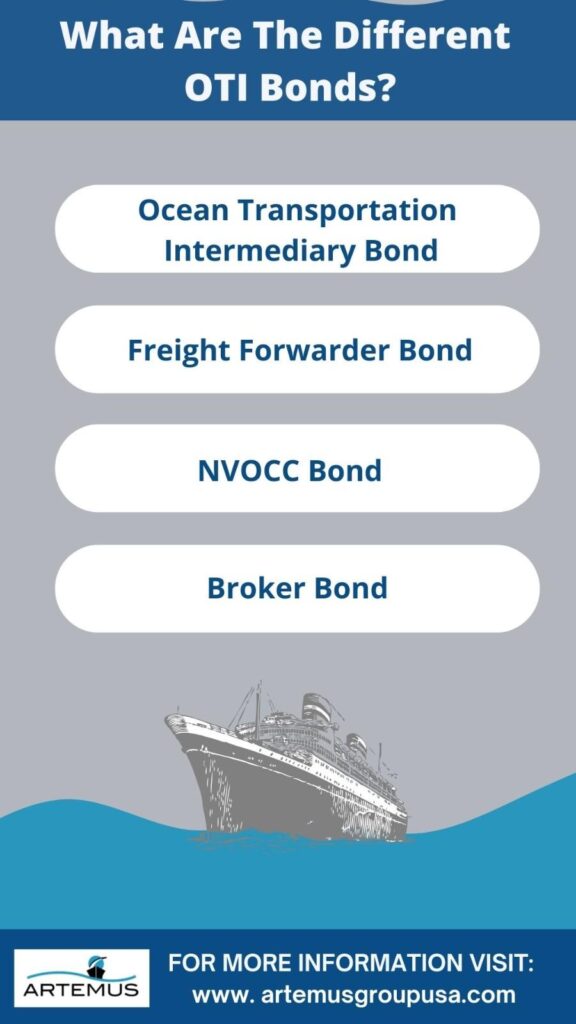
What Is Inbound Logistics & Outbound Logistics? A 2025 Guide
In the dynamic world of supply chain management, understanding the nuances of inbound and outbound logistics is crucial for operational

Navigating the complexities of international shipping requires a thorough understanding of various regulatory requirements, one of which is the Non-Vessel-Operating Common Carrier (NVOCC) bond. An NVOCC bond is a financial guarantee required by the Federal Maritime Commission (FMC) for companies that operate as NVOCCs.
This bond ensures that these entities adhere to the regulations set forth by the FMC, providing a level of protection for shippers and consignees against potential breaches of contractual obligations or other regulatory violations.
Artemus offers comprehensive software solutions for NVOCC that seamlessly integrate ISF (Importer Security Filing) and AMS (Automated Manifest System) processes, ensuring efficient and accurate compliance with U.S. Customs and Border Protection (CBP) regulations.
Table Of Contents
An NVOCC bond is a financial guarantee required by the Federal Maritime Commission (FMC) for Non-Vessel-Operating Common Carriers (NVOCCs) operating in the United States. An NVOCC is a type of freight forwarder that doesn’t own or operate ships but instead arranges cargo transportation through various carriers.
The bond serves as a form of insurance that ensures compliance with regulatory requirements and protects shippers and consignees in case of non-performance or financial failure of the NVOCC.
Related: What Is NVOCC? Meaning & Details You Need To Know

Ocean Transportation Intermediary (OTI) bonds are essential financial instruments required by the Federal Maritime Commission (FMC) for certain entities operating in the international shipping industry.
These bonds serve to ensure that Ocean Transportation Intermediaries—such as freight forwarders and Non-Vessel-Operating Common Carriers (NVOCCs)—adhere to regulatory standards and fulfill their financial obligations. Here’s a look at the different types of OTI bonds:
The OTI Bond is a broad term that encompasses both Freight Forwarder Bonds and NVOCC Bonds. It ensures that all Ocean Transportation Intermediaries operating in the U.S. comply with FMC regulations and fulfill their financial obligations.
This bond is crucial for maintaining the integrity and reliability of the international shipping industry, providing protection for all parties involved in the transportation process.
A Freight Forwarder Bond is required for businesses that operate as freight forwarders. These intermediaries arrange the transportation of cargo but do not operate the vessels themselves.
The Freight Forwarder Bond guarantees that the freight forwarder will comply with FMC regulations, handle cargo properly, and meet all financial obligations to shippers. This bond protects shippers and consignees by providing a financial remedy in case of the freight forwarder’s default or failure to meet contractual obligations.
The NVOCC Bond is specifically required for Non-Vessel-Operating Common Carriers. NVOCCs arrange transportation for cargo without owning or operating the vessels.
Like the Freight Forwarder Bond, the NVOCC Bond ensures compliance with FMC regulations and provides financial protection for shippers and consignees. This bond acts as a safeguard against potential losses or damages resulting from the NVOCC’s failure to fulfill its contractual or regulatory responsibilities.
The Broker Bond is required for individuals or companies acting as customs brokers. These brokers handle the import and export of goods, ensuring that all customs regulations are met.
The Broker Bond guarantees that customs brokers will adhere to legal requirements and properly manage financial transactions related to customs duties and tariffs. It provides a financial safety net for clients in case of the broker’s non-compliance or financial misconduct.
Related :NVOCC Software For Streamlined Compliance & Why You Need It?
Applying for an NVOCC (Non-Vessel-Operating Common Carrier) bond involves several key steps. Here’s a detailed overview of the process:
Related: NVOCC VS Freight Forwarder: Differences & Who To Choose?
NVOCC bonds ensure maritime compliance and protect against NVOCC failures, customs bonds guarantee payment of import duties and adherence to customs regulations, surety bonds cover a broad range of contractual obligations, and performance bonds specifically guarantee the completion of projects or contracts.
Each bond type serves distinct purposes and is regulated differently:
Related: NVOCC License Requirements: What You Need To Know
Maintaining compliance with NVOCC bonds is crucial for Non-Vessel-Operating Common Carriers (NVOCCs) to ensure smooth operations, protect stakeholders, and adhere to Federal Maritime Commission (FMC) regulations.
Here are a few crucial tips on how to stay compliant with NVOCC bonds:
NVOCCs must have a thorough understanding of the specific requirements related to their bond. This includes the bond amount, which is determined by the FMC and varies based on the size of the NVOCC’s operations. Ensure that you are aware of the bond’s terms and conditions and how they apply to your business.
Keeping precise and up-to-date records is essential for compliance. This includes:
Periodically review your NVOCC bond coverage to ensure it remains adequate for your business needs. This includes:
Compliance with FMC regulations is a cornerstone of maintaining your NVOCC bond. This includes:
Establish robust internal controls to mitigate the risk of non-compliance. This can involve:
In the event of a claim against your bond, respond promptly and effectively. This involves:
Keep open lines of communication with your bonding company and the FMC. Regular updates and discussions can help address any potential issues before they escalate.
Stay up-to-date with changes in FMC regulations and industry standards. Subscribe to relevant industry newsletters, participate in trade associations, and attend conferences to stay informed about regulatory updates and best practices.
Related: AMS Filing Requirements For Importers, Carriers, & NVOCCs
The cost of an NVOCC bond, also known as an NVOCC financial responsibility bond, can vary based on several factors, including the size of the bond required and the risk profile of the Non-Vessel-Operating Common Carrier (NVOCC).Here are the main factors that affect the cost:
The Federal Maritime Commission (FMC) sets the minimum bond amount at $75,000 for NVOCCs. However, the actual cost of securing a bond is generally a percentage of this amount, known as the premium. The premium is influenced by the risk assessment of the NVOCC.
The cost of an NVOCC bond is largely determined by the risk profile of the NVOCC. Insurers evaluate factors such as the NVOCC’s financial stability, business history, and overall risk in the industry. A higher perceived risk can lead to higher premiums.
Typically, the premium rate for an NVOCC bond ranges from 1% to 3% of the total bond amount. For a $75,000 bond, this translates to an annual premium cost between $750 and $2,250. Some bonding companies may offer different rates based on the specifics of the NVOCC’s operations.
In some cases, there may be additional costs associated with obtaining an NVOCC bond. These can include application fees, administrative fees, or renewal fees. It’s essential for NVOCCs to review all potential costs with their bonding provider.
NVOCC bonds are typically valid for one year, after which they must be renewed. The renewal process usually involves paying the annual premium again, which may be subject to adjustments based on changes in the NVOCC’s risk profile.
Related: What Is A Certificate Of Origin For A Vehicle? Key Details
The cost of securing an NVOCC bond, also known as a surety bond, can vary significantly based on several factors. Understanding these factors is crucial for NVOCCs to manage their financial obligations effectively and ensure compliance with regulatory requirements.
Here are the primary factors influencing the costs associated with NVOCC bonds:
The amount of the bond required by the Federal Maritime Commission (FMC) is a significant factor in determining the cost. The FMC typically sets a minimum bond amount, but NVOCCs may be required to post higher amounts depending on their volume of business and risk profile. Higher bond amounts generally result in higher premiums.
The creditworthiness of the NVOCC plays a crucial role in determining the cost of the bond. Surety companies assess the financial stability and credit history of the NVOCC to gauge risk. NVOCCs with strong credit histories and stable financials are likely to receive lower bond premiums, while those with poor credit may face higher costs.
An NVOCC’s experience and reputation in the industry can affect the cost of the bond. Established NVOCCs with a proven track record of reliable and compliant operations are viewed as lower risk by surety companies. As a result, they may benefit from reduced bond premiums compared to newer or less experienced operators.
The scale and volume of an NVOCC’s operations can impact the bond cost. Larger NVOCCs with higher shipping volumes may face higher bond premiums due to the increased risk associated with handling a larger volume of cargo. Conversely, smaller NVOCCs with limited operations might encounter lower costs.
The overall risk profile of the shipping industry can influence bond costs. Factors such as economic conditions, changes in regulations, and industry-specific risks can affect the perceived risk of providing a bond. In times of economic uncertainty or heightened industry risks, bond premiums may rise.
The type of bond required and its duration can also impact costs. While most NVOCC bonds are continuous and remain in force until canceled, some might have specific terms or conditions that could affect the premium. Understanding the type of bond and its conditions is essential for accurately assessing costs.
Related: ISF Form (Import Security Filling): Elements & Top Practices
At Artemus, we provide comprehensive support for Import Security Filing (ISF) and Automated Manifest System (AMS) filings through advanced software solutions. Our ISF software ensures that all necessary data is accurately submitted to U.S. Customs and Border Protection (CBP) before goods arrive in the U.S., helping you comply with import regulations and avoid costly delays.
Similarly, our AMS software facilitates the seamless filing of manifest information, ensuring that all required data elements are transmitted correctly and promptly to CBP.
With Artemus, you can navigate the complexities of import compliance with confidence, leveraging our expertise and technology to streamline your filing processes and enhance operational efficiency.
Related : What Is Ocean Freight Forwarding & Its Process?
The NVOCC bond is a financial guarantee required by the Federal Maritime Commission (FMC) for Non-Vessel-Operating Common Carriers (NVOCCs) to ensure regulatory compliance and protect shippers and consignees against financial loss due to the NVOCC’s failure to fulfill its obligations.
An NVOCC (Non-Vessel-Operating Common Carrier) is a freight forwarder that arranges cargo transportation through various carriers without owning or operating ships themselves.
The FMC Bond is a financial guarantee required by the Federal Maritime Commission for Non-Vessel-Operating Common Carriers (NVOCCs) to ensure compliance with regulatory requirements and provide financial protection against potential losses or failures.

In conclusion, understanding and securing an NVOCC bond is crucial for non-vessel operating common carriers to operate legally and efficiently within the U.S. maritime industry. This bond not only safeguards against potential financial liabilities but also reinforces the trust and credibility of NVOCCs with clients and regulatory bodies.
By ensuring compliance with the Federal Maritime Commission’s regulations, NVOCCs can avoid costly penalties and build stronger relationships in the global shipping ecosystem.
Investing in a robust NVOCC bond is not just a regulatory requirement but a strategic move toward operational excellence and reliability in the competitive freight forwarding market.
Related: Advantages And Disadvantages Of NVOCC: 10 Key Distinctions

In the dynamic world of supply chain management, understanding the nuances of inbound and outbound logistics is crucial for operational

In today’s interconnected world, businesses rely heavily on global trade to expand their markets, access new resources, and drive growth.

Importing goods for resale in the USA presents a lucrative business opportunity, but navigating the complexities of U.S. customs regulations,
Get In Touch
Artemus’ Software Solutions for ISF, AMS, Japan AFR, eManifest Canada, & Panama B2B filings.